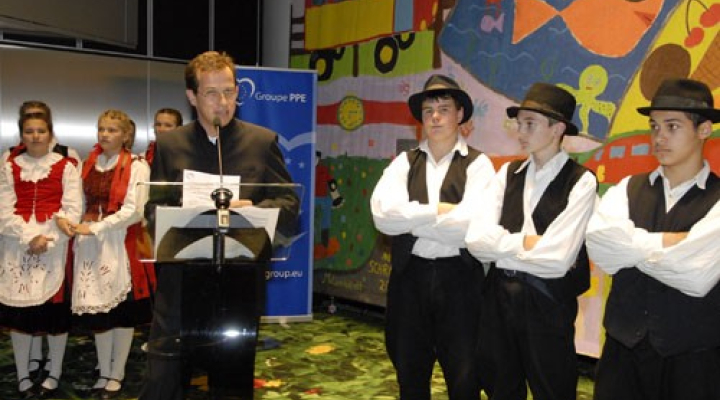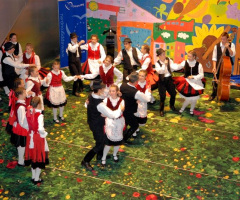For this lesson to get through and convince those in the West who shut their eyes and ears
In his greeting, Mr. Sógor Csaba emphasized the importance of 1956 in Transylvania:
„Dear Guests,
Today we remember the Hungarian Revolution of 1956. We also have a Hungarian dance group from Transylvania as our guest.
In 1956 the youth of Transylvania also rose up against the communist system just like their peers in Hungary. Even those who had been silent organizers or just simple sympathizers ended up in prison or even to face a firing squad. Later the regime dissolved our university, took away our right of self government.
We, Hungarians, traditionally celebrate through dance. Even at the commemoration of a revolution. Why through dance? Because the language of dance is international, it doesn’t require translation, everyone can understand it.
Today we can celebrate freely. Not just the Hungarian communities
living in seven EU-member states, but everyone who believes in the
European values, in a free, fair and cohesive society. The goals the
Hungarian revolutionary fighters gave their life for are still waiting
to be fulfilled in some member countries. Albert Camus wrote a long
time ago in his 1957 essay, The blood of the Hungarians:
„And on this anniversary of liberty, I hope with all my heart that the silent resistance of the people of Hungary will endure, will grow stronger, and, reinforced by all the voices which we can raise on their behalf, will induce unanimous international opinion to boycott their oppressors.
(...) Hungary conquered and in chains has done more for freedom and justice than any people for twenty years. But for this lesson to get through and convince those in the West who shut their eyes and ears, it was necessary, and it can be no comfort to us, for the people of Hungary to shed so much blood which is already drying in our memories.
In Europe's isolation today, we have only one way of being true to
Hungary, and that is never to betray, among ourselves and everywhere,
what the Hungarian heroes died for, never to condone, among ourselves
and everywhere, even indirectly, those who killed them.
It
would indeed be difficult for us to be worthy of such sacrifices. But
we can try to be so, in uniting Europe at last, in forgetting our
quarrels, in correcting our own errors, in increasing our creativeness,
and our solidarity. We have faith that there is on the march in the
world, parallel with the forces of oppression and death which are
darkening our history, a force of conviction and life, an immense
movement of emancipation which is culture and which is born of freedom
to create and of freedom to work.” – Sógor Csaba quoted from the
Nobel-prize winner author’s essay. The visitors also received a copy of
the French and English translation of Camus’ work.
- Let’s celebrate with the dances of Transylvanian folk-dance group Zergeboglár from Kászonaltíz and let us not forget about those who have given their lives so that we can celebrate freely today, so that we can build a better Europe – the MEP summed up.












